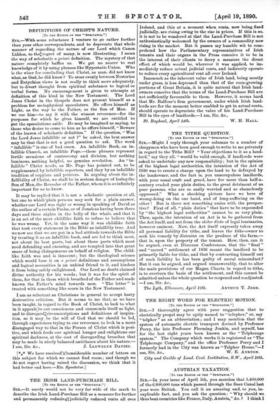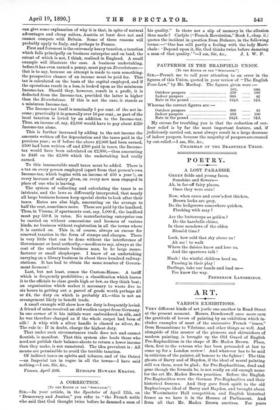AUSTRIAN TAXATION.
Fro THE EDITOR Or THE " SPECTATOR."]
Sra,—In your issue of April 5th, you mention that 5,400,000' of the 6,800,000 tons which passed through the Suez Canal last year were British. You call it an amazing and, to you, in- explicable fact, and you ask the question : "Why should we thus beat countries like France, Italy, Austria," &c. P I think I can give some explanation of why it is that, in spite of natural advantages and cheap sailors, Austria at least does not and cannot compete with Britain. Some of these reasons will probably apply to Italy, and perhaps to France.
First and foremost is the extremely heavy taxation, a taxation which falls principally on business enterprise and on land, the extent of which is not, I think, realised in England. A small example will illustrate the case. A business undertaking, before it has even earned a penny, must pay an Erwerbsteuer,— that is to say, because an attempt is made to earn something, the prospective chance of an income must be paid for. This tax is calculated on the basis of the capital employed, and if the operations result in a loss, is looked upon as the minimum Income-tax. Should they, however, result in a profit, it is deducted from the Income-tax, provided the latter is higher than the Erwerbsteuer. If this is not the case, it stands as a minimum Income-tax.
The Income-tax itself is nominally 5 per cent, of the net in- come ; practically it is generally over 16 per cent., as part of the local taxation is levied by an addition to the Income-tax. Thus, an income of, say, 22,000 would have to pay about £320 Income-tax alone.
This is further increased by adding to the net income the amounts written off for depreciation and the taxes paid in the previous year ; so if before the above 22,000 had been earned, £500 had been written off and £300 paid in taxes, the Income- tax would have been calculated on £2,800,—thus amounting to £448 on the 22,000 which the undertaking had really earned.
To this innumerable small taxes must be added. There is a tax on every person employed (apart from that person's own Income-tax, which begins with an income of £50 a year !), on every increase of salary given, on every new man engaged in place of one who is leaving.
The system of collecting and calculating the taxes is so intricate, and the laws so differently interpreted, that nearly all large business houses keep special clerks to look after their taxes. Rates are also high, amounting on the average to half the rent, sometimes more. These are paid by the landlord. 'Thus, in Vienna, if apartments cost, say, 1,000 fl., the landlord must pay 550 fl. in rates. No manufacturing enterprise can be carried on without concessions and licences of various kinds, no business without registration in all the towns where it is carried on. This is, of course, always an excuse for renewed taxation in the form of stamps and charges. There is very little that can be done without the interference of Government or local authority,—needless to say, always at the cost of the unfortunate business man, be he large manu- facturer or small shopkeeper. I know of an undertaking carrying on a library business in about three hundred railway- stations. It has had to obtain the same number of Govern- ment licences!
Last, but not least, comes the Custom-House. A tariff which is frequently prohibitive ; a classification which leaves it to the officials to class goods high or low, as they think best ; an organisation which makes it necessary to waste five to six hours in getting out a parcel of goods worth perhaps £3 or £4, the duty on which is probably £1,—this is not an arrangement likely to benefit trade.
A small example will show how the duty is frequently levied. A friend of mine received an old woollen carpet from Germany. In one corner of it his initials were embroidered in silk, and he was therefore charged as if the whole carpet had been of silk ! A whip with a silver handle is classed as silver, &e. The rule is : If in doubt, charge the highest duty.
That under such circumstances trade does not and cannot flourish, is manifest. That this system also leads those who need not publish their balance-sheets to return a lower income than they make, is not unnatural. The idea prevalent is : All means are permissible to avoid the terrible taxation.
Of indirect taxes on spirits and tobacco, and of the Octroi --an Imperial tax in vogue in all the towns—I have said nothing.—I am, Sir, &c.,
Vienna, April 10th. RUDOLPH HOWARD KRAUSE.



















































 Previous page
Previous page